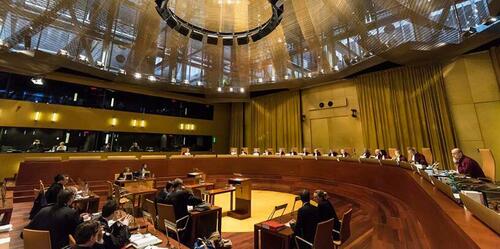
Authored by Grzegorz Adamczyk via Remix News,
The European Commission’s decision to sue Poland over its constitutional court rulings is making the European Court of Justice a de facto Supreme Court of Europe...
The European Commission has decided to challenge the Polish constitutional court over not only its assertion of the supremacy of the Polish constitution over European law, but also to question the appointment of three justices of the court as well as the election of the chief justice herself. This move escalates the rule of law dispute to a new level.
The European Commission is effectively arguing that Poland’s constitutional court has ceased to be an independent entity and is now a creature of the government.
The commission is taking an unprecedented step. It will be the first time the European Court of Justice (ECJ) has been asked to assess the functioning of a member state’s constitutional court and its verdicts. If the European court rules in favor of the commission, its ruling will have consequences that go way beyond the dispute over the observance of the principle of the rule of law in Poland.
It will mean that the ECJ has asserted its right to review the work of member states’ constitutional courts and to challenge their verdicts. In this way, the ECJ in Luxembourg would effectively become a Supreme Court of Europe able to interpret and adjudicate the constitutional laws of the member states.
The European Commission’s decision cannot but affect the political situation in Poland. Last Friday, President Andrzej Duda submitted the legislation passed by the Polish parliament on disciplinary procedures for judges for review by the constitutional court. The law was passed in order to change the very procedure objected to by the European Union so that the Commission would unblock Poland’s share of the EU Recovery Fund.
The Polish president’s move looks like a further delay to Poland’s access to its EU recovery fund allocation is inevitable, but the European Commission’s decision to question the credentials of the constitutional court complicates matters still further.
This is because it is more than likely that the ECJ will suspend the workings of the court, just as it did with regard to the Disciplinary Chamber of the Supreme Court. Or it may suspend the four justices whose appointments have been challenged, therefore making it impossible for the court to sit in full session until the ECJ has made a final ruling, a process that could take years.
The latest developments have not brought Poland any closer to unlocking EU funds and threaten a political conflict between Warsaw and Brussels that could lead to a chain reaction. The constitutional court could simply refuse to suspend its working and the ruling majority could opt for a full-scale confrontation with the European Commission, with the ruling conservatives going to the electorate, blaming Brussels, and accusing it of attempting to deprive Poland of its sovereignty.
Authored by Grzegorz Adamczyk via Remix News,
The European Commission’s decision to sue Poland over its constitutional court rulings is making the European Court of Justice a de facto Supreme Court of Europe…
The European Commission has decided to challenge the Polish constitutional court over not only its assertion of the supremacy of the Polish constitution over European law, but also to question the appointment of three justices of the court as well as the election of the chief justice herself. This move escalates the rule of law dispute to a new level.
The European Commission is effectively arguing that Poland’s constitutional court has ceased to be an independent entity and is now a creature of the government.
The commission is taking an unprecedented step. It will be the first time the European Court of Justice (ECJ) has been asked to assess the functioning of a member state’s constitutional court and its verdicts. If the European court rules in favor of the commission, its ruling will have consequences that go way beyond the dispute over the observance of the principle of the rule of law in Poland.
It will mean that the ECJ has asserted its right to review the work of member states’ constitutional courts and to challenge their verdicts. In this way, the ECJ in Luxembourg would effectively become a Supreme Court of Europe able to interpret and adjudicate the constitutional laws of the member states.
The European Commission’s decision cannot but affect the political situation in Poland. Last Friday, President Andrzej Duda submitted the legislation passed by the Polish parliament on disciplinary procedures for judges for review by the constitutional court. The law was passed in order to change the very procedure objected to by the European Union so that the Commission would unblock Poland’s share of the EU Recovery Fund.
The Polish president’s move looks like a further delay to Poland’s access to its EU recovery fund allocation is inevitable, but the European Commission’s decision to question the credentials of the constitutional court complicates matters still further.
This is because it is more than likely that the ECJ will suspend the workings of the court, just as it did with regard to the Disciplinary Chamber of the Supreme Court. Or it may suspend the four justices whose appointments have been challenged, therefore making it impossible for the court to sit in full session until the ECJ has made a final ruling, a process that could take years.
The latest developments have not brought Poland any closer to unlocking EU funds and threaten a political conflict between Warsaw and Brussels that could lead to a chain reaction. The constitutional court could simply refuse to suspend its working and the ruling majority could opt for a full-scale confrontation with the European Commission, with the ruling conservatives going to the electorate, blaming Brussels, and accusing it of attempting to deprive Poland of its sovereignty.
Loading…







